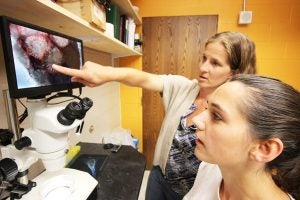Mentor: Koty Sharp, Roger Williams University
Co-Mentor: Alicia Schickle, Roger Williams University
Project Location
Roger Williams University
Project Description

The local temperate coral Astrangia poculata is an emerging model organism used to understand the microbiology of coral bleaching, a phenomenon that is directly caused by warming sea surface temperatures. Recent analyses of A. poculata in our lab suggest that its microbiome exhibits an unusual level of stability and can recover from environmental disturbances such as extreme temperature fluctuations. Identification of the drivers of seasonal microbiome shifts can help further understand the significance of microbiomes to health and resilience to climate change in local organisms. More broadly, the succession patterns in A. poculata microbiome recovery may translate to a deeper understanding of the role of microbes in resilience to climate change, and tropical coral disease and bleaching.
In our lab, we use A. poculata to test hypotheses about the fate and transport of plastics-associated microbes in Narragansett Bay benthic organisms, with a specific focus on the ability for microplastics-associated microbes to impact the health of the benthic organisms that incidentally co-ingest them.
Students will work on two specific, closely related projects: 1) molecular analysis of microbiomes in laboratory and field-disturbed Astrangia poculata colonies; and 2) laboratory-based assays monitoring and tracking microplastics ingestion in A. poculata with a variety of microbes and plastics types. Student researchers will gain experience with molecular biology and microbiology benchwork, sequencing analysis and bioinformatics, coral husbandry, and field sample collection and processing.
Additional Information
- Dr. Sharp’s Research Page
- “How A Tough New England Coral May Help Its Tropical Cousins,” a piece by Barbara Moran, WBUR Boston

 RI NSF EPSCoR is supported in part by the U.S. National Science Foundation under EPSCoR Cooperative Agreements #OIA-2433276 and in part by the RI Commerce Corporation via the Science and Technology Advisory Committee [STAC]. Any opinions, findings, conclusions, or recommendations expressed in this material are those of the author(s) and do not necessarily reflect the views of the U.S. National Science Foundation, the RI Commerce Corporation, STAC, our partners or our collaborators.
RI NSF EPSCoR is supported in part by the U.S. National Science Foundation under EPSCoR Cooperative Agreements #OIA-2433276 and in part by the RI Commerce Corporation via the Science and Technology Advisory Committee [STAC]. Any opinions, findings, conclusions, or recommendations expressed in this material are those of the author(s) and do not necessarily reflect the views of the U.S. National Science Foundation, the RI Commerce Corporation, STAC, our partners or our collaborators.